Rugby World Cup a global game-changer, says RFU's Ritchie
- Published
The Rugby World Cup is providing the opportunity for the game to sell itself to a new audience
The 2015 Rugby World Cup is a crucial showpiece not only for growing the sport in the UK and internationally, but the tournament also provides a window of opportunity for business and economic spin-offs from the event.
Analysis by accountancy group Ernst & Young (E&Y) estimates the event will attract more overseas visitors than any previous Rugby World Cup, with those visitors spending significant sums on the host economy - from tickets to travel costs, accommodation, match-day entertainment, and visiting other tourist attractions.
The cup, being held in cities across England, and one in Wales, could deliver up to £2.2bn to the host economy, says E&Y, a tournament supplier.
Meanwhile, the six-week long event should provide opportunities for businesses involved in everything from kit and equipment etc, while the commercial department at the Rugby Football Union (RFU), the tournament's host association, will also be looking for new potential partnerships.
'Economic impact'
The RFU's chief executive Ian Ritchie, and the man responsible for making the tournament run smoothly, tells the BBC website that he expects to see big benefits on and off the playing field.
"This Rugby World Cup is undoubtedly the biggest ever in terms of viewers, people coming to see games, people watching on television, and therefore is the ultimate showcase for the game," says Mr Ritchie, who has been at the helm at Twickenham for more than three years.
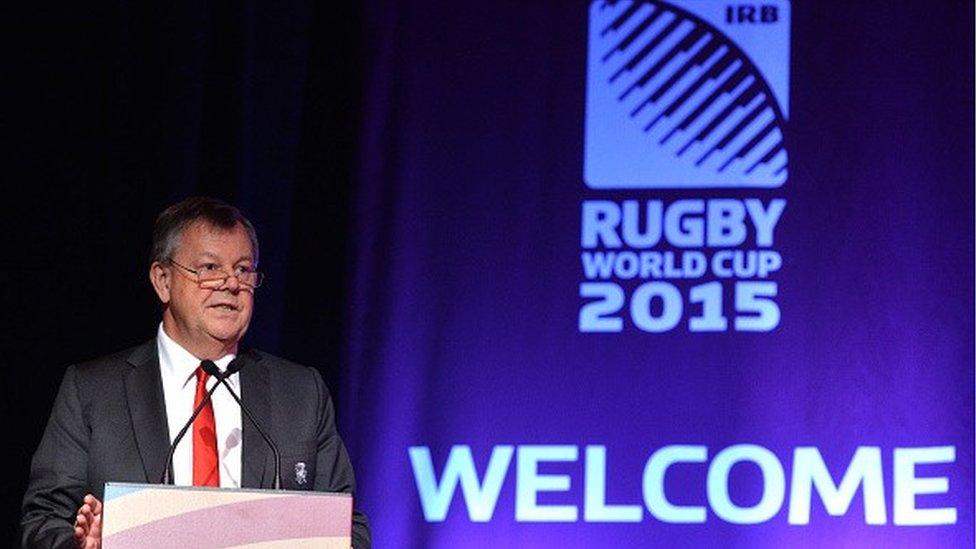
RFU boss Ian Ritchie says the World Cup is good for sports business
"Anybody who is connected with the business of rugby is going to have more eyeballs, more people looking, watching, and that has to be great for business.
"And it is great for business as well - from an economic impact point of view here in the UK it is going to generate over £2.2bn here, but it will [also] generate internationally, I think, some fantastic revenue for rugby."
Mr Ritchie says the RFU is looking at up to half a million people coming from overseas to attend games and spend time in the 10 different host cities across England, and Cardiff in Wales.
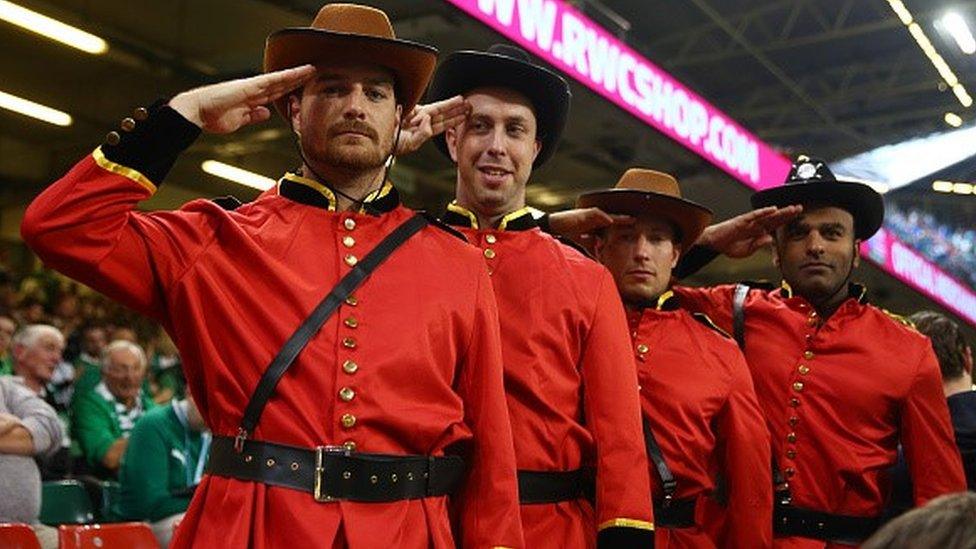
Mr Ritchie says the host cities will benefit from the spending power of rugby fans
"What they do is they spend accordingly... and there are gaps in between games, so from a tourism point of view its extremely positive," he says.
"Each city is organising fan zones, activities around the event itself, which will all add to the economic impact, which is very positive."
Grassroots drive
To secure the right to host the World Cup, the RFU had to give World Rugby, the global governing body, an £80m financial guarantee.
"As far as World Rugby is concerned, the Rugby World Cup is all about garnering money, [and] the profit from the event will go directly into global investment in rugby to grow the game," says Mr Ritchie, who was previously chief executive of the All-England Lawn Tennis Club for six years.
In England the number of adults playing rugby in England dipped in 2013, but bounced back a bit last year.
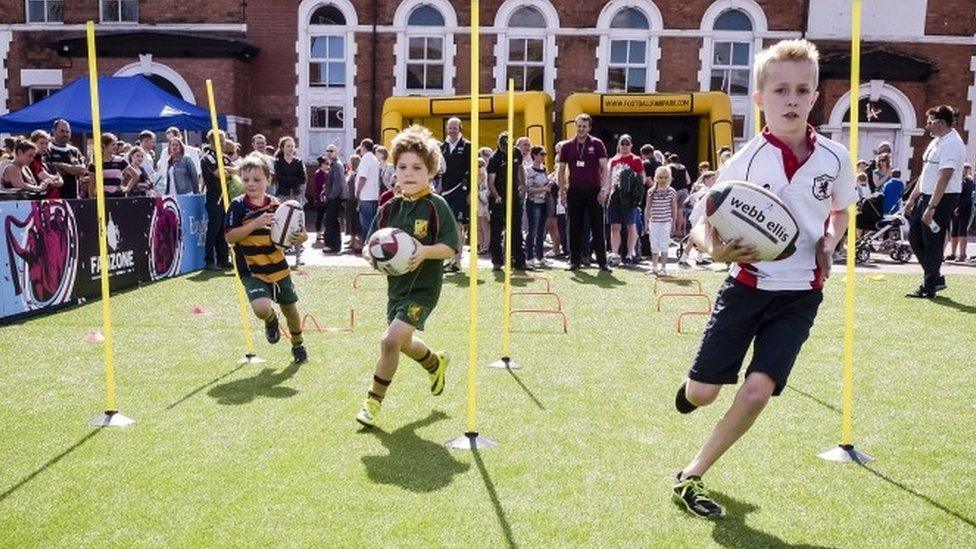
One of the RFU's three objectives from the Rugby World Cup is to grow grassroots participation
"We (the RFU) have three objectives for the tournament," says Mr Ritchie. One - to be a great host, welcoming everybody who is coming. Secondly we want to do well in the tournament, obviously we would love to win it. Thirdly, it is about growing participation in rugby."
He said the event was a great tool for selling the sport to a new generation of children, and encouraging them to play, as well as hopefully convincing more adults to get involved as players, coaches, referees, or general volunteers.
'Sustainable growth'
"I think rugby is a great game, everybody can play of all shapes and sizes, we've had a great growth in women's rugby, in sevens, in touch, in variations," he says.
Mr Ritchie says that strong ticket sales for the event, means that the event should be economically successful for the RFU, and provide it with strong revenues for putting back into the grassroots game, and for growing the sport in England, beyond its current geographic heartlands.
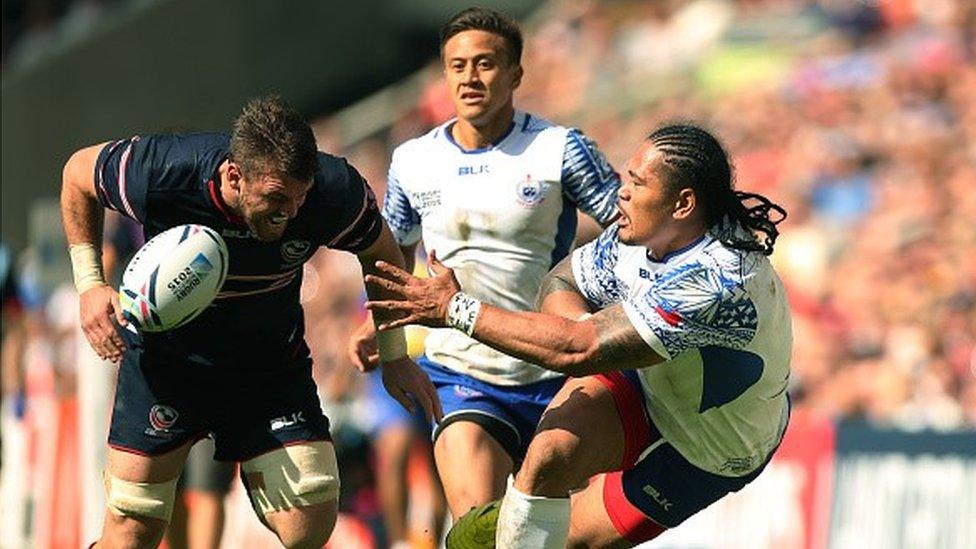
Mr Ritchie says the Rugby World Cup should leader to greater global exposure for the sport
He adds: "But most importantly I think it is going to grow the game around the world, because hundreds of millions of people will be watching on TV."
He says that while the biggest Rugby World Cup should "inevitably" result in greater participation globally, the biggest challenge, "which we have all got to plan for, is then continuing that over the next year or two".
"I think you will always see a short-term blip in participation, certainly here we have been planning for this for the last three years, and you have got to have the schemes in place to have sustainable growth," he adds.
Olympic Games impetus
However, the 61-year-old believes that the sport's participation, in the form of rugby sevens - the seven-a-side version of the game - in the 2016 Olympic Games in Rio should help keep the ball rolling.

Rugby sevens will be part of the 2016 Olympics
"To have the sevens in the Olympics for the first time is a tremendous spurt for the game and will create a lot of that interest. This is a [format of the] game that all shapes and sizes can play, you don't have to be 6 feet 5 inches and 18 stone, you can be much smaller, nippier, it is a great game for children."
He adds: "It is very interesting in sevens that you see [national] Olympic committees who are investing in their sevens setup, sometimes countries that are not well known for playing rugby.
"And that is the pull and the delight of the Olympics, and certainly we have seen some of our sevens [players] transitioning into 15 [a-side] as well."
Meanwhile, the former barrister remains aware of the financial as well as sporting impetus of the World Cup.
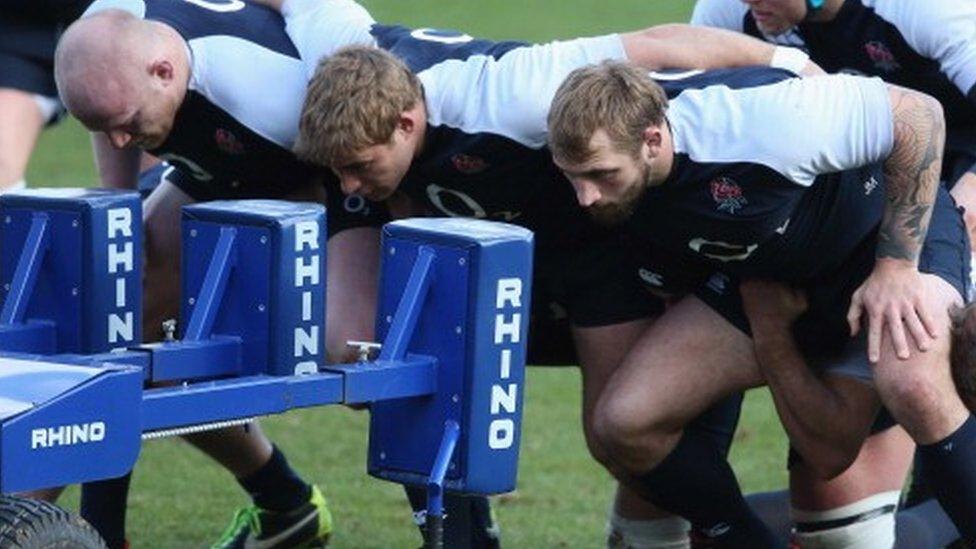
The event offers an opportunity to manufacturers of rugby equipment
"I think one of the great things is finding [business] partners to invest in the sport, and we have our partners, World Rugby do, and there is a great opportunity to do a lot of business around here," says Mr Ritchie.
"Most of the major companies in the world have a connection with rugby and we want that to grow, and to grow in partnership. So at what is the best showcase for the game you'd hope to do a little business as well and I am sure we will."